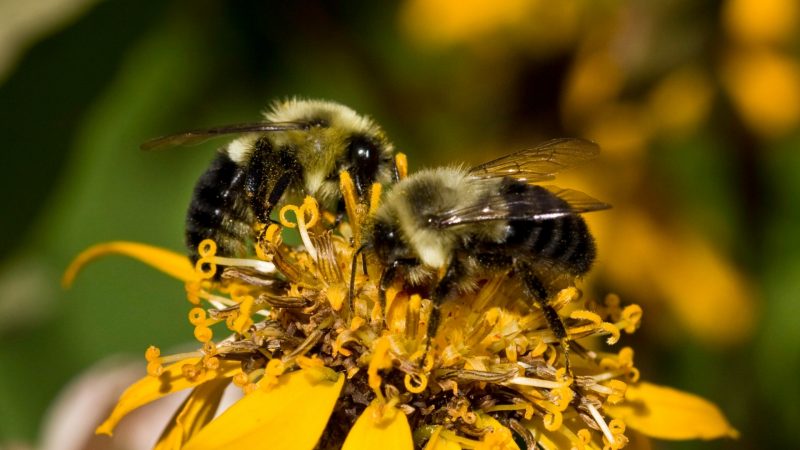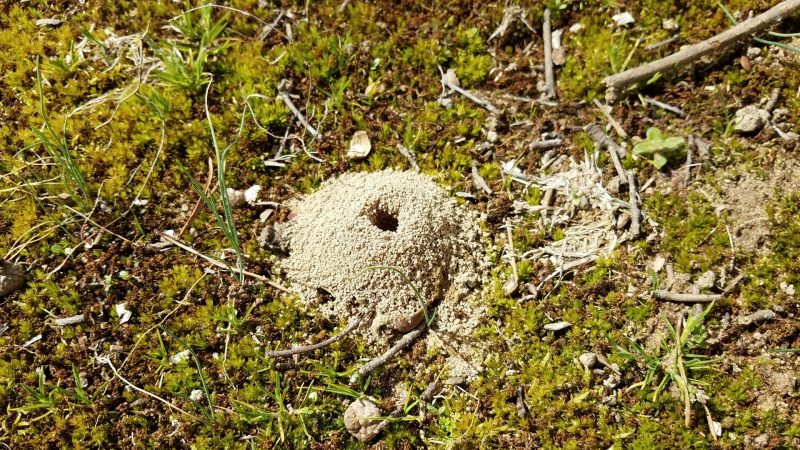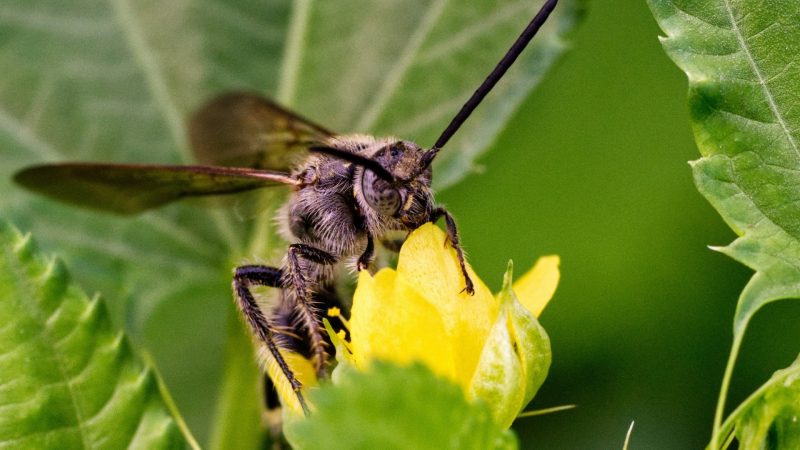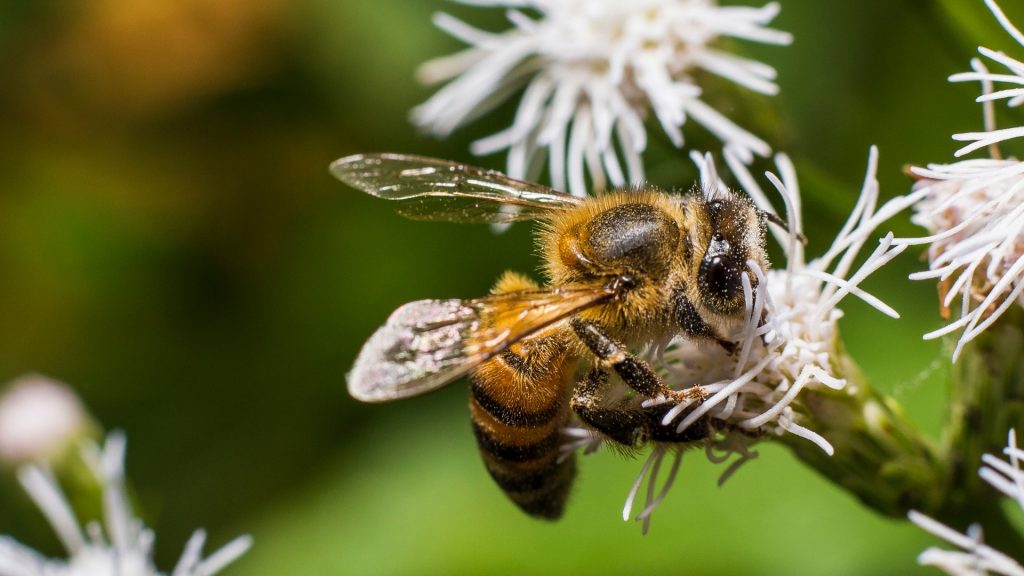Ground bees are helpful bees that play an essential role in pollination and aren’t considered pests. However, many people don’t like the unattractive holes these creatures leave in their yards and want to get rid of them. Luckily, it isn’t difficult to make ground bees relocate.
How to get rid of ground bees? You can get rid of ground bees by spraying a mixture of vinegar and water over their nests. Other ways to eliminate them, add peppermint essential oils to the soil, or sprinkle diatomaceous earth in and around their nests. Pesticides should be a last resort.
This article will tell you everything you might want to know about ground bees and we will cover step by step how to eliminate them.
Table of Contents
What Are Ground Bees?

Unsurprisingly, ground bees are bees that make their nests underground. There are several different species of ground bees. Despite the image most people have of bees living in hives and making honey, the truth is that 70% (about 14,000 species) of bees nest underground.
What Kind of Bees Live In the Ground?
Since nearly 14,000 bee species live underground, trying to list them all would be challenging. However, it may surprise you to learn that some of the most well-known bees are ground creatures, including:
- Bumblebees
- Sweat bees
- Leaf-cutting bees
- Digger bees
Difference Between Ground Bees and Honey Bees
The biggest difference between ground bees and honey bees is that the former don’t make honey. Naturally, honey bees do.
Depending on the type of ground bee, the two might also look different, although a few ground bee species look remarkably similar to honey bees.
While neither are super aggressive, honey bees are more likely to sting than ground bees. Ground bees rarely sting unless you disturb their nest or they feel imminently threatened. They can, however, sting more than once. In contrast, honey bees can only sting once and lose their stingers when they do.
Do Ground Bees Make Honey?
Ground bees don’t make honey, and they don’t build hives. With few exceptions, they’re solitary and not a social bees.
However, they’re still important to the environment because they’re pollinators. If you have a flower or vegetable garden, you may appreciate the help ground bees provide.
Are Ground Bees Protected?
Of all the 20,000+ species of bees, only eight are endangered. All eight are species of ground bees. These eight are the only “protected” bees under the Endangered Species Act. These include the following:
- Hylaeus longiceps
- Hylaeus anthracinus
- Hylaeus facilis
- Hylaeus assimulans
- Hylaeus kuakea
- Hylaeus hilaris
- Bombus affinis
- Hylaeus mana
All first seven bees are all species of Hawaiian yellow-faced bees. The last is the scientific name of the rusty patched bumblebee.
Do Ground Bees Sleep at Night?
Some ground bees come out at night, but on the whole, most tend to sleep at night for about five to eight hours.
The only species of bee considered truly “nocturnal” is the Indian carpenter bee. A few other species are occasionally active at night, but mostly, bees are diurnal.
What Animals Eat Ground Bees?
Surprisingly, quite a few animals eat ground bees, wasps, hornets, and honey bees. These animals include:
- Black bears (They prefer honey bees, but they sometimes eat ground bees.)
- Birds, including ruby-throated hummingbirds, magpies, and blackbirds
- Badgers
- Skunks
- Raccoons
- Weasels
- Various reptiles and amphibians
Spiders will also eat ground bees, assuming they can catch them in their webs. There are also a few species of predatory insects that eat them.
Ground Bees or Burrowing Bees Identification

Ground bees can be hard to identify because there are so many varieties, and many look nothing alike. Sweat bees and bumblebees, for example, are wildly different bee species in both size and appearance. However, you can usually tell if you have ground bees by checking out their nests.
What Does a Ground Bee Nest Look Like?
This video shows you what ground bee nests look like from the outside:
The easiest time to spot a nest is when the bees are building it. During this period, the nests look like anthills because the bees heap the dirt they’re burrowing into a pile. Entrances to the nests are in the top center of each mound, and they’re usually larger and rounder than anthill entrances.
At other times, ground bee nests are harder to spot. You can look for circular holes in the ground. These are generally dime-sized, but they can get as large as quarters.
Are Ground Bees Aggressive?

Ground bees aren’t naturally aggressive. They rarely sting unless they feel threatened, and it takes a lot to make them feel threatened. Simply walking near them doesn’t usually do it. Unless you try to destroy their nests or catch, hold, or hit them, they’ll seldom act aggressively.
Do Ground Bees Sting, and Do They Leave a Stinger?
Ground bees can sting, and they will if they feel threatened. However, unlike honey bees, ground bees keep their stingers when they sting. Doing so allows them to sting multiple times if necessary, so be careful. It’s hard to anger a ground bee, but once you do, it might not stop at a single sting.
How Do You Treat Ground Bee Stings?
Unless allergic reactions to ground bee stings are severe, treatment usually consists of covering the sting site with a soothing ointment and taking an oral antihistamine. More severe reactions may require an epi-pen or a visit to the nearest doctor’s office, hospital, or clinic.
Should You Get Rid of Ground Bees?

Most of the time, there’s no reason to get rid of ground bees. They’re docile and don’t damage soil or plants. On the contrary, they’re pollinators and will help your garden grow. However, there are a few reasons people might want to get rid of them.
People with small children are afraid the bees will hurt their babies. Children are curious and might reach for the bees to pet them or play with them. In those cases, the bees might sting.
Finally, people who are severely allergic to bees might not want the risk of having bees around.
How to Get Rid of Ground Bees?
There are several ways to get rid of ground bees. Most are chemical-free and natural, although pesticides also work.
One method is to use plain water. The steps for this method are beyond simple:
Step 1: Find the areas where the bees are nesting.
Step 2: Stand back and liberally spray the areas with the garden hose.
Step 3: Saturate the ground thoroughly.
If the bees are stubborn or keep returning, set up a sprinkler system like the Orbit 58911 Complete Yard Watering Kit. Ground bees like to nest in dry soil. Keep your lawn regularly watered, and they won’t nest there.
What Is the Best Insecticide for Killing Ground Bees?
If at all possible, it’s best not to use chemicals or pesticides with ground bees. Because they’re good for the environment, you don’t want to kill them unless there’s no other alternative. Additionally, you don’t need to kill them because it’s easy to get them to move.
However, if you’re set on this course of action, the best product to kill ground bees is the Bonide 363 Spider And Ground Bee Killer. It’s inexpensive, effective, and features an easy-to-use puffer applicator.
Insecticide Dust for Ground Bees
Many people wonder if Sevin dust is effective against ground bees. Sevin dust works wonders on Japanese beetles, ticks, worms, and other pests, but it doesn’t work with ground bees. If you’re looking for insecticide dust for ground bees, try the Bayer Tempo Dust instead.
Best Ground Bee Spray
Although meant for wasps and hornets, the Raid Wasp and Hornet Killer is also pretty effective against ground bees. Just remember that even non-aggressive ground bees will sting if you put them in danger, so don’t get too close to the bees or the nests with this stuff, or you’re likely to get stung.
Will Bleach Kill Ground Bees?
Bleach isn’t something we’d recommend using to kill ground bees. While it may be somewhat effective, it’s not something you want to pour all over your lawn. Furthermore, a mixture of water and dish soap is just as effective and not nearly as toxic to things other than bees.
How to Get Rid of Ground Bees Without Chemicals?
There are plenty of natural ways to get rid of or kill ground bees. Like most insects, bees hate peppermint, so using a mixture of peppermint oil and water will drive them away. If you mix in some dish soap with peppermint oil, you’ll suffocate them.
Other natural remedies for ground bees include:
- Cayenne pepper
- Cucumber and cucumber peels
- Vinegar/water mixture
Killing Ground Bees With Water
Water is an effective weapon against ground bees. It doesn’t kill them (although with enough time, water, and effort, you could drown them), but it’ll drive them away just as effectively as if you were killing them.
Ground bees like dry soil. They won’t nest in your lawn if you keep it nice and moist.
How to Kill Ground Bees With Borax?
Borax powder is another convenient way to kill ground bees. Just pour the borax down the nest holes. Within a day or so, the bees should be dead. Doing this requires you to get close to the nests. So be sure to wear protective clothes, gloves, and maybe even goggles.
Diatomaceous Earth for Ground Bees
Diatomaceous Earth products, such as the HARRIS Diatomaceous Earth Crawling Insect Killer, are also effective at killing bees and plenty of other insects. It is 100% natural and works by cutting through insects’ exoskeletons and drying them out. Pour it in and around the ground bees’ nests to kill them.
Summary
Ground bees aren’t pests, and they don’t usually bother humans or domestic animals unless threatened. They only stay in an area for about a month to six weeks and cause no damage to plants, soil, or grass. That said, unless you must get rid of them, it’s best if you leave them alone and let them pollinate your plants.
However, if you must get rid of them, water is the easiest, safest, and most humane way to do it. You can also use a vinegar/water solution, diatomaceous earth, cucumber and cucumber peels, or peppermint essential oils. You should avoid pesticides unless other methods didn’t work.
List of Sources
Ground Nesting Bees in Your Backyard!